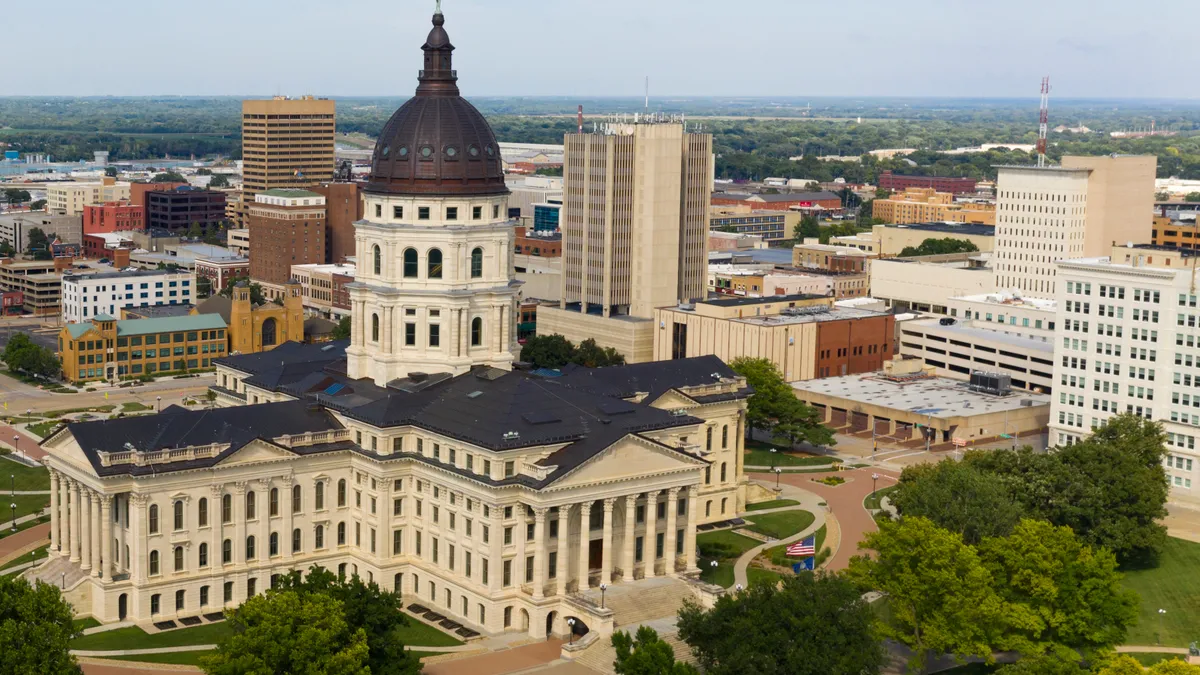Dive Brief:
- Kansas Attorney General Derek Schmidt said in a letter last week that two public universities are breaking a new state law that makes it easier for employees to receive religious exemptions from coronavirus vaccine mandates.
- Gov. Laura Kelly, a Democrat, signed into law last month a statute requiring employers to waive vaccine requirements for all workers who sign a written statement verifying getting the shots would violate their sincerely held religious beliefs. Schmidt's letter asked Kansas State University and the University of Kansas to change their vaccine policies to comply with the state law.
- A University of Kansas spokesperson said the institution has updated its forms, processes and deadlines to do so. A Kansas State spokesperson did not answer Higher Ed Dive's question about whether it was changing its policies in response to the letter.
Dive Insight:
The University of Kansas and Kansas State both mandated coronavirus vaccines for all employees after President Joe Biden issued an executive order requiring the shots for federal workers and contractors. The universities also told employees they may be eligible for medical or religious waivers from the mandate.
Schmidt's letter said the waiver processes at the universities violated the new law because they used "intrusive written application materials" when evaluating an employee's exemption request. The new law merely requires employees to sign a written statement verifying their religious beliefs in order to receive a waiver.
However, the institutions' forms, which the letter says are similar to each other, asked workers to describe their religious tenets and sought third-party documentation to support that they hold their beliefs. "None of this information is necessary except to support an inquiry into the sincerity of an employee's claim, which is no longer relevant," Schmidt wrote.
The letter showcases the complexity and ever-shifting nature of the federal and state orders that colleges must navigate when crafting coronavirus vaccine mandates.
Waiver policies can be even thornier. While legal experts say the law is largely on colleges' side when mandating the shots, some judges have struck down waiver policies at institutions that limited who could receive exemptions.
In the letter, Schmidt also took aim at the institutions' deadlines for employees to be fully vaccinated or receive exemptions. The Biden administration recently extended the deadline for federal contractors from Dec. 8 to Jan. 18, but the University of Kansas initially kept the December cutoff for its own workers. That ran afoul of state law, Schmidt argued.
He also called attention to a lawsuit challenging the legality of Biden's mandate for federal contractors that the state of Kansas recently joined. In it, seven mostly conservative states — including Utah, Alabama and West Virginia — are asking a judge to block the executive order within their borders. The court plans to hold a hearing on the matter Friday.
"In light of this timeline, it is imprudent for a Regents institution to insist on its own authority that its employees be fully vaccinated by December 8, 2021," Schmidt wrote. A University of Kansas spokesperson said in an email that the institution's deadlines have been updated to align with both Schmidt's letter and the federal mandate.
The Kansas Board of Regents, which oversees the two universities named in the letter, did not immediately respond to Higher Ed Dive's request for comment.
Other lawsuits also challenge Biden's order. A federal judge on Tuesday granted a request from Tennessee, Ohio and Kentucky to block the mandate from being carried out in those states. The ruling came a day after a different federal judge stopped the Biden administration from enforcing a vaccine mandate for healthcare workers in 10 states, all of which have either a Republican governor or attorney general, The Associated Press reported.















